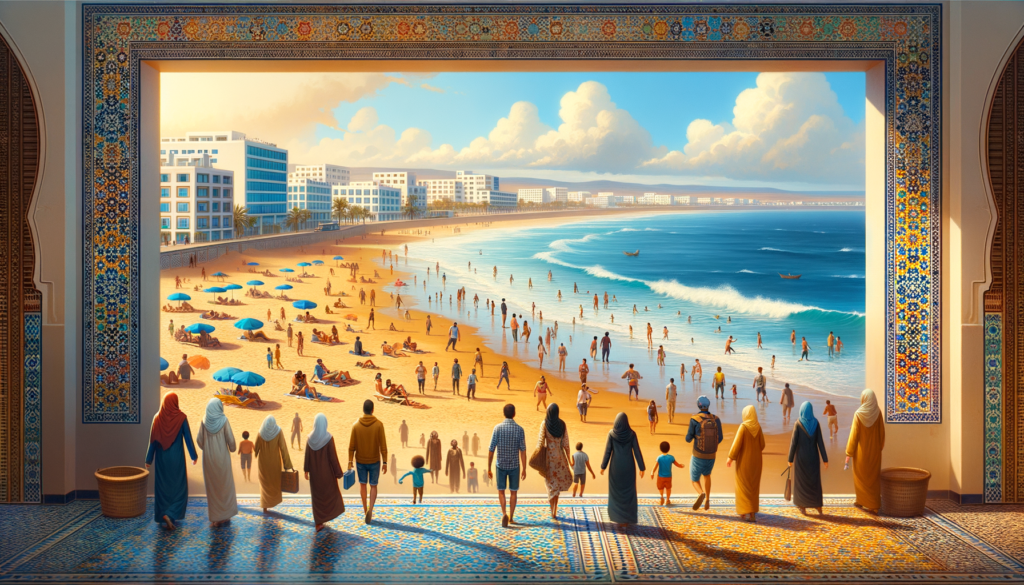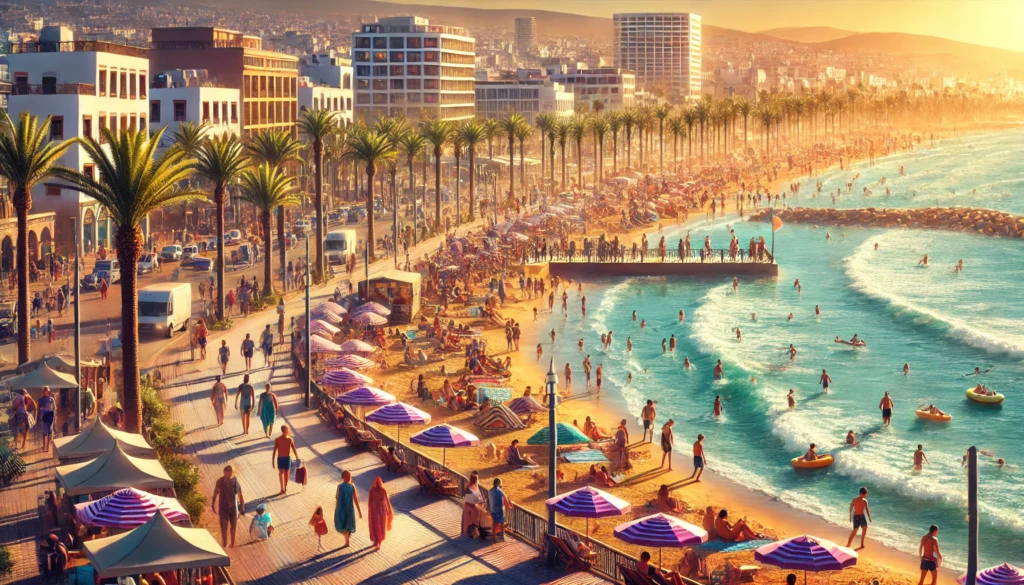
Golden beaches stretching endlessly under the sun, a laid-back vibe, and the allure of North African culture—Agadir is a magnet for travelers seeking both relaxation and adventure. Nestled along Morocco’s Atlantic coastline, this resort city boasts modern amenities and a welcoming climate that have made it a favorite among tourists worldwide.
But for LGBTQ+ travelers, the question of safety often lingers beneath the excitement of planning a trip to countries like Morocco. The nation’s cultural fabric, deeply rooted in conservative, Islamic traditions, coupled with strict legal frameworks, requires a nuanced understanding for visitors wanting to explore its beauty while staying mindful of its societal norms.
In this blog post, we’ll delve into whether Agadir is safe for LGBTQ+ travelers, examining the legal landscape, cultural attitudes, and practical tips that can help travelers navigate their journey. Armed with this knowledge, you’ll be better equipped to explore all that Morocco—and Agadir—has to offer with confidence and respect.
Legal and Social Context in Morocco
Legal Framework: Article 489 of the Moroccan Penal Code
One of the first facts LGBTQ+ travelers should be aware of is Morocco’s legal stance on homosexuality. Under Article 489 of the Penal Code, same-sex relations are criminalized, with penalties that can include imprisonment and fines. This law applies universally, covering both Moroccan nationals and foreigners, which unequivocally raises the stakes for LGBTQ+ travelers.
While enforcement of these laws tends to focus on local LGBTQ+ communities, travelers should not assume immunity. Legal risks, no matter how infrequently the law might be enforced, remain a critical consideration for anyone planning a visit to Morocco.
Conservative Cultural Backdrop
Beyond the legal framework, Morocco’s cultural identity is deeply rooted in Islamic traditions that uphold conservative values. Public discussions around LGBTQ+ rights remain taboo, and societal attitudes largely reflect a lack of acceptance for LGBTQ+ individuals. Being openly LGBTQ+ in Morocco, whether as a local or a visitor, can invite discrimination, harassment, or worse.
That said, Moroccan society also operates on a certain degree of discretion—what is kept private is often tolerated more than openly displayed behaviors. For LGBTQ+ travelers, this provides a small window of leniency, provided local norms and boundaries are respected.
Navigating the Duality: Risks and Norms
For locals, this duality of legal risk and societal discretion demands a careful balancing act. For visitors, it becomes crucial to blend in and tread lightly. While LGBTQ+ travelers are unlikely to face issues if they stay within the bounds of discretion, ignorance of local customs or overt behavior could escalate a situation unnecessarily. The key is to remain informed, alert, and respectful of cultural nuances to minimize risk while enjoying the unique charm of Morocco.
Public Displays of Affection in Morocco
General Conservatism Around PDA
Morocco, as a predominantly Islamic country, takes a conservative stance on public displays of affection (PDA) for all couples, regardless of orientation. It’s worth noting that while heterosexual couples might sometimes face subtle disapproval for overly affectionate behavior in public, LGBTQ+ couples may encounter heightened scrutiny due to the country’s legal and cultural framework.
Specific Risks for LGBTQ+ Travelers
LGBTQ+ visitors are advised to exercise greater caution regarding public displays of affection, even in seemingly relaxed or tourist-heavy areas. While harassment isn’t guaranteed, the dual layers of social and legal conservatism mean that expressions of romantic affection between same-sex couples could potentially attract unwanted attention or worse.
Tips for Blending In
For LGBTQ+ travelers, discretion is key. To ensure comfort and safety:
- Avoid behaviors that might stand out or draw attention, particularly in less tourist-centered zones.
- Focus on non-physical expressions of affection when in public spaces.
- Observe the behaviors of locals to gauge what is socially acceptable in different settings.
By adapting to the prevailing cultural expectations, travelers can avoid unnecessary risks and enjoy their experience more freely.
What LGBTQ+ Travelers Need to Know About Agadir

Agadir Compared to Other Moroccan Cities
Agadir, with its sun-drenched beaches and laid-back vibe, is often considered one of Morocco’s more relaxed destinations. While it doesn’t offer a distinctly LGBTQ-friendly scene, the city’s touristic nature creates a somewhat more tolerant environment compared to more traditional or rural locations.
When compared to cities like Marrakech and Tangier, Agadir feels less cosmopolitan, but its appeal lies in its calm, beach-centric atmosphere. Marrakech, for example, has a reputation for being relatively LGBTQ-friendly, hosting a small but notable gay scene in some areas. Agadir, on the other hand, draws LGBTQ+ tourists who prioritize unwinding in a sunny, less bustling location.
Beaches and Tourist Areas
Agadir’s beaches and tourist districts offer an environment that’s slightly more relaxed than its inland counterparts. Beaches, in particular, are melting pots of cultures and visitors, where norms tend to be more permissive than in traditional or rural areas. Yet, understanding and respecting local customs remains crucial.
For safety and enjoyment, LGBTQ+ travelers are encouraged to stay within well-frequented tourist areas or resorts, which offer a more enclosed bubble of cultural tolerance. Venturing too far into less tourist-heavy neighborhoods may increase the risk of discomfort or unwelcome attention.
Local Venues
Agadir does not have a dedicated gay scene, but certain establishments are viewed as welcoming to the LGBTQ+ community. One such spot is the Flamingo Oriental Night Club. Although not exclusively LGBTQ+ focused, it is known among travelers and locals as a more inclusive space.
Travelers seeking a lively night out in Agadir may find solace in such venues, but discretion and cultural sensitivity remain vital, especially outside the confines of the nightlife sphere.
General Travel Tips for LGBTQ+ Visitors to Agadir
Avoid Dating Apps
While dating apps might be a convenient way to connect with locals in many travel destinations, they come with inherent risks in Morocco. There have been cases of entrapment and outing, which can lead to dangerous and humiliating situations. LGBTQ+ travelers are strongly advised to avoid using dating apps to safeguard their privacy and security.
Respect Local Culture
Morocco’s societal norms are deeply rooted in conservative, Islamic traditions. It’s crucial for LGBTQ+ travelers to act with heightened awareness when navigating cultural sensitivities. Modest dressing is a particularly important aspect of showing respect, as is avoiding any overtly romantic gestures in public. This level of discretion is about both safety and cultural respect.
Consider LGBTQ+-Friendly Locations
While Agadir has a laid-back tourism vibe, LGBTQ+ travelers might find added comfort by balancing their itinerary with destinations that are more LGBTQ+-friendly. Cities like Marrakech or Tangier have a growing reputation for offering slightly more progressive spaces and welcoming venues. Planning a multi-city trip can provide a mixture of experiences while mitigating potential risks.
Conclusion
Agadir can be a rewarding destination for LGBTQ+ travelers, but care and discretion are paramount. As with any trip, understanding the cultural and legal context is essential to ensuring safety and building positive travel experiences. While Morocco as a whole presents challenges due to its conservative stance on LGBTQ+ rights, the country also offers incredible landscapes, vibrant culture, and warm hospitality. By taking time to prepare, showing cultural sensitivity, and staying informed, LGBTQ+ travelers can navigate Agadir—and Morocco at large—both safely and fulfillingly.
FAQ: LGBTQ+ Safety and Traveling in Agadir, Morocco
Is Agadir safe for LGBTQ+ travelers?
Agadir is relatively safe for LGBTQ+ travelers, especially in tourist hotspots like the beaches. However, caution is advised due to Morocco’s laws and societal attitudes toward homosexuality. Discretion is recommended to ensure safety.
What is the legal situation for LGBTQ+ individuals in Morocco?
Homosexuality is illegal in Morocco and punishable under Article 489 of the Penal Code, which includes prison sentences and fines. Societal attitudes are generally conservative, reflecting the country’s Islamic values.
Are public displays of affection safe in Agadir?
Public displays of affection, even mild ones, are generally frowned upon in Morocco’s conservative culture. This applies to both LGBTQ+ and heterosexual couples. LGBTQ+ travelers are strongly advised to avoid any public displays of affection to ensure their safety.
Does Agadir have a gay-friendly scene or venues?
Agadir does not have a defined gay scene. However, some venues like the Flamingo Oriental Night Club are known to be more welcoming and tolerant of LGBTQ+ individuals. These are not exclusively gay venues but are frequented by diverse crowds, including LGBTQ+ tourists.
Should LGBTQ+ travelers use dating apps in Morocco?
No, it is highly discouraged. Dating apps pose a risk of entrapment by authorities or outing by other individuals. For LGBTQ+ travelers, avoiding such platforms is crucial for safety.
What other Moroccan destinations are considered LGBTQ+-friendly?
While Morocco as a whole adheres to conservative values, cities like Marrakech and Tangier are known for their cosmopolitan atmospheres and relatively more established LGBTQ+-friendly communities and venues compared to Agadir.
What general safety tips should LGBTQ+ tourists follow in Morocco?
LGBTQ+ tourists should focus on discretion, avoid public displays of affection, dress modestly, and respect local customs and laws. Additionally, staying in tourist-heavy areas and refraining from using dating apps are key to having a safe, enjoyable experience.